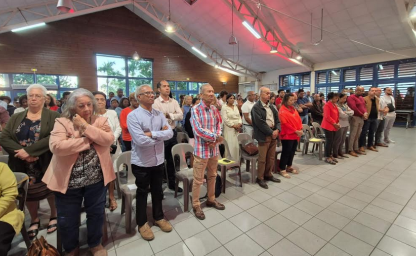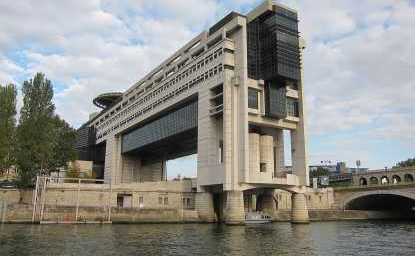
Assemblée générale de la section PCR de Sainte Suzanne
2 juillet, parC’est dans une ambiance chaleureuse avec un état d’esprit fraternel que les délégués de la Section PCR de Sainte-Suzanne se sont réunis en (…)
Human Rights
20 September 2012

Severe water shortages in refugee camps close to the Sudanese border have contributed to a rise in mortality and malnutrition rates to alarming levels, in what is a major humanitarian crisis. The ICRC has launched a project to improve water access for about 37,000 people in Yusuf Batil camp.
Fleeing armed conflict, many thousands of Sudanese refugees from Blue Nile state in Sudan have flooded into South Sudan’s Maban county, Upper Nile state, since September 2011. Their numbers have been increasing since May. Living in remote areas at home, most arrive exhausted after an arduous journey on foot that can last weeks. They have found shelter in isolated camps whose stretched resources are often insufficient to cover peoples’ basic needs.
"The humanitarian situation in Yusuf Batil camp in particular is extremely worrying. Conditions are dire and survival remains a struggle. Owing to the lack of clean water, people are drinking contaminated surface water. Children are especially vulnerable to death from water-borne diseases such as diarrhoea," said Melker Mabeck, head of the ICRC delegation in South Sudan. "The ICRC is tackling this emergency by expanding the camp’s water infrastructure and distributing jerrycans and buckets so people are better able to collect and store water."
The ICRC plans to install water distribution piping, storage tanks, tapstands and pumps to provide enough water for half the camp’s population. This should ease pressure on existing systems and bring overall water access in the camp up to the minimum required standard. Currently refugees in Yusuf Batil have access to very limited quantities only, with water coverage especially poor for those sheltered on the camp’s peripheries.
In addition, the entire camp population will receive items to protect themselves from the elements, such as clothing, tarpaulin, blankets, mosquito nets and sleeping mats. Seasonal heavy rains, which will continue through to November, make the area extremely inhospitable, creating thick mud and large swathes of stagnant water. The rains also make transporting aid to the camp a logistical challenge, with all supplies having to be airlifted into the area.
Meanwhile in nearby Jamam refugee camp, also suffering from very limited water coverage, the ICRC is now close to completing a 15-kilometre distribution pipeline to provide better access to water for the 30,000 refugees sheltering there.
Some of the refugees flooding into the three camps in Maban county lost contact with their family members in the chaos of fleeing their homes. Since July, the ICRC has helped approximately 250 people get back in touch with their loved ones by giving them the opportunity to make phone calls or send written messages.
In addition, in August the ICRC reunited three Ugandan women with their families in Uganda. The women, who found freedom after having been abducted by an armed group, were repatriated from Yambio in the south-western region of South Sudan.
A six-week campaign is under way in Twic county, Warrab state, to vaccinate an estimated 100,000 animals against major disease. The campaign, conducted jointly with the Ministry of Animal Resources and Fisheries, mainly benefits cattle farmers and herders who rely on their animals as a source of income. Twic county is on the transhumance route for several cattle-raising tribes.
Nearly 8,000 villagers from the Shilluk Kingdom, located in Upper Nile state, have been registered to receive essential items for the household such as mosquito nets and tarpaulins, after clashes in April 2012 drove them from their homes. The villagers are now starting to return, to find many of their houses were destroyed and much property looted.
The ICRC medical team based in the Malakal Teaching Hospital provides paediatric and physiotherapy services along with trauma and emergency surgical care. This includes war surgery performed in the hospital or at the scene of the fighting. Since the start of July, the team performed over 80 surgical operations while 400 patients received physiotherapy.
The ICRC’s operations in southern Sudan began in 1986. The organization set up a delegation in South Sudan’s capital city, Juba, when the country became independent on 9 July 2011. The ICRC also has two sub-delegations in the new country, in Malakal and Wau. In South Sudan, the ICRC works to prevent violations of international humanitarian law and supports hospital and physical rehabilitation services. It also helps conflict-affected communities to survive and become self-sufficient.
GENEVA, Switzerland, September 20, 2012/African Press Organization (APO)/

C’est dans une ambiance chaleureuse avec un état d’esprit fraternel que les délégués de la Section PCR de Sainte-Suzanne se sont réunis en (…)

Nou la di lotro-zour : Tikarl-la in marmay la teknik, Tikok : in marmay lé plis poèt-poèt ! Sa lé bon, mé soman, l’inn konm lot i pé fé gingn aou (…)


Mézami fitintan lo mo « dékonèr » lété konm i di in galissism pars li té pliss in mo la lang franssèz popilèr la rante an missouk dan la lang (…)

Les 132 régions européennes de la coalition "EUregions4cohesion" rencontrent les vice-présidents exécutifs de la Commission Européenne, Raffaele (…)

C’est avec stupéfaction et colère que nous découvrons la volonté du gouvernement de faire des économies sur la prise en charge des affections de (…)

Le 16 juin 2025, le Tribunal administratif de Paris a suspendu en référé l’arrêté du 26 février 2025 ordonnant le blocage de 17 sites (…)

Les cours du pétrole ont connu une nette hausse à partir de la deuxième quinzaine du mois de juin, portés par l’extrême tension au Moyen-Orient et (…)

Dans les départements d’outre-mer, près d’une femme sur deux qui devient mère ne vit pas en couple, configuration familiale bien plus fréquente (…)

Mézami, mon bann dalon, mi panss zot i rapèl la mortalité, laba dann Moris, lo gran kiltirèl épi politik Dev Virashwamy ; li lé mor na pwin lontan (…)

La dette française atteint 114% du PIB au premier trimestre, soit près de 48.800 euros par Français. De fait, des crédits initialement prévus « ne (…)

Dan noute kiltir popilèr néna bonpé kozman pou dir sa la éspass dann tan lontan… Mi koné pa pou koué, mé mwin néna dan l’idé k’ni viv in pé an (…)